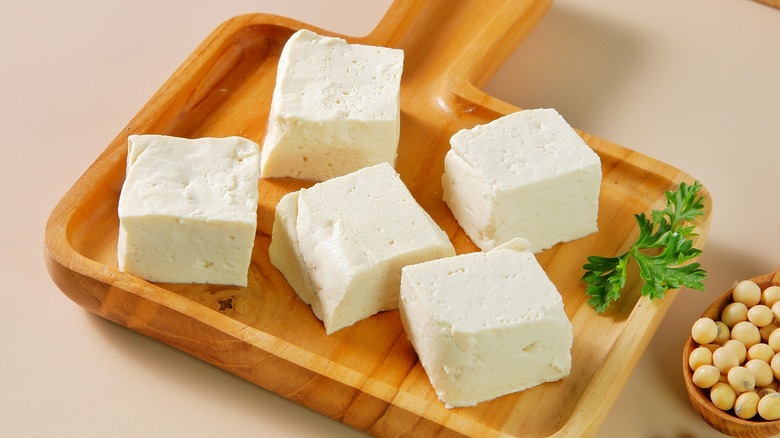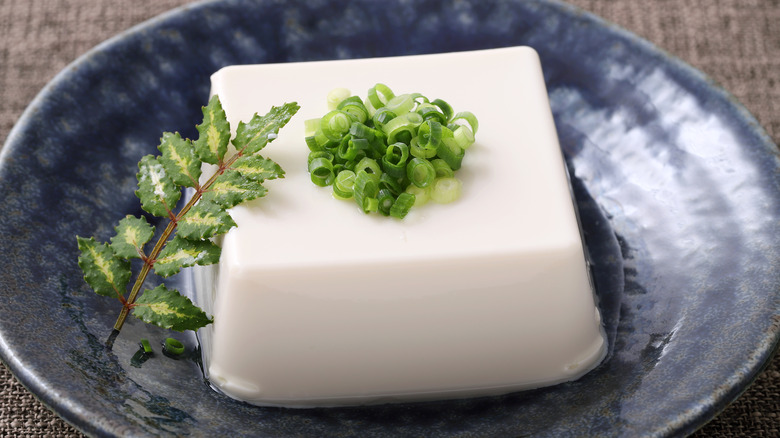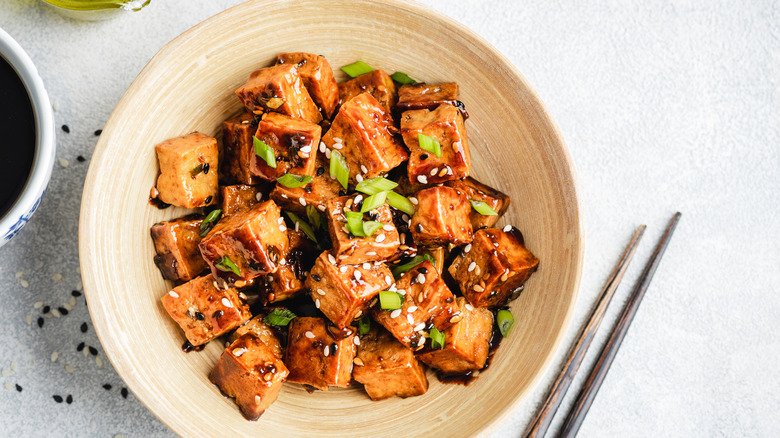Is There A Nutritional Difference Between Silken And Firm Tofu?
Tofu has long been touted as a versatile protein source, with its origins dating back to ancient China. While naysayers may view its tasteless nature as a waste of space on the dinner plate, proponents champion tofu as a blank canvas for flavor, absorbing sauces, marinades, and dry rubs as well as any steak or fillet of fish. Tofu is composed of cooked soybeans that have been filtered of liquid and compressed into the individually packed square masses you see lining refrigerated shelves at your local grocery store. You'll likely see a range of different varieties categorized by texture with silken and firm tofu at opposite ends of the texture spectrum.
As with cheese or yogurt, tofu undergoes varying degrees of filtration, leading to different consistencies. Silken tofu is the least filtered form, creating a jiggly, soft texture and a creamy, melt-in-your-mouth consistency. Firm tofu is the most filtered form, with a dense, chewy texture similar to a medium-hard cheese-like paneer. And despite its delicate consistency, there are many more ways to use silken tofu than its firm counterpart.
There's also a notable nutritional difference between silken and firm tofu. While both silken and firm tofu are healthy and delicious sources of macro and micronutrients, their different nutritional values have specific benefits for distinct diets.
Silken tofu
Silken tofu has a higher water content, lowering its concentration of macronutrients. This means a lower calorie count than firm tofu, with only 61 calories per 100 grams. Silken tofu is also a leaner source of protein than firm tofu, with a ratio of protein to fat that is over 10% higher than that of firm tofu. But despite its higher water content, silken tofu has a larger concentration of sodium than firm tofu.
Silken tofu and firm tofu are both high in Omega-3 and Omega-6 fatty acids, and they're both good sources of vitamins C, A, E, and calcium. However, silken tofu has a lower ratio of calcium than firm tofu. It also has a different B complex profile, with higher levels of B3, B9, and B6, which provide energy. While differences in protein, carbs, and fat are relatively small between silken and firm tofu, they each offer different profiles of vitamins and minerals to the mix.
Firm tofu
Firm tofu gets its chewy, substantial texture due to its elaborate filtration process. This filtration process is also responsible for its heartier nutritional content. Filtering most of the water out of cooked soybeans packs more macronutrients per bite than silken tofu. Consequently, firm tofu has a higher calorie count of 144 calories per 100 grams.
A side-by-side comparison of one cup of silken tofu versus one cup of firm tofu shows that firm tofu is consistently higher in protein, carbs, and fat by between 2 to 3 grams than silken tofu. Firm tofu also contains more dietary fiber and less sugar than silken tofu. This effectively puts firm and silken tofu on a level playing field regarding net carbs.
In addition, firm tofu has close to four times the iron as silken tofu and over twice the calcium. Firm tofu has a high content of vitamins B1, B2, and B5. According to the Harvard School of Public Health, these B vitamins assist in cell function, cancer, and heart disease prevention, and reducing cholesterol, respectively.


